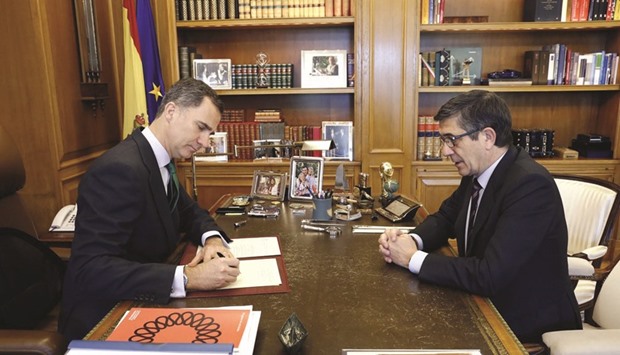Spain’s King Felipe dissolved parliament yesterday and called a new national election for June 26 after a vote in December left such a fractured political landscape that no government could be formed.
The new vote follows four months of fruitless coalition talks between Spain’s four main parties after the inconclusive ballot stripped the conservative People’s Party (PP) of acting Prime Minister Mariano Rajoy of its majority.
The re-run is not expected to herald a major shift in voting patterns, opinion polls show, likely forcing bickering leaders to once again try to forge a coalition.
“Let’s hope we’ve all learned our lesson and that the next parliament reaches an agreement (on forming a government) as soon as possible,” parliament president Patxi Lopez told a news conference, confirming the king had signed the election decree.
Spain has never had to repeat elections since the country returned to democracy following the death of long-time dictator General Francisco Franco in 1975.
“It is the first time that this has happened in the democratic era because we were unable to fulfil the mandate citizens gave us,” Lopez added.
Conducted against a backdrop of economic hardship and with a political elite tainted by accusations of corruption, December’s election marked the end of the dominance of the two traditional parties, the PP and the Socialists, that have governed Spain since its transition back to democracy in the mid-1970s.
Spain has never had a coalition government and parties tried in vain since the polls to cobble together a governing alliance.
Much of the negotiations had centred around left-wing parties after Rajoy – whose conservative PP won the December election but lost its majority – gave up trying to form a government for lack of support.
The Socialists (PSOE) – who came second in the polls with just 90 parliamentary seats out of 350 – were tasked by the king to try and bring other parties together in a coalition, but ultimately failed.
Socialist leader Pedro Sanchez managed to strike a deal on a government with centrist upstart Ciudadanos – which came fourth in the election – but the two parties had too few seats in parliament to win a vote of confidence.
He then tried to enlist the support of new far-left party Podemos, whose 65 parliamentary seats would have got it through, but failed.
During negotiations the quartet of party leaders failed to bridge significant policy gaps, including how to manage the economy and how to soothe an independence drive in regional powerhouse Catalonia.
A blame game between parties on who was responsible for the repeat election is likely to dominate campaigns – due to kick off formally on June 10 – as politicians seek to galvanise frustrated voters and ward off a rise in abstention.
Some of the parties are already considering alliances.
Podemos may team up with the former communists of Izquierda Unida (United Left), which would help unite the vote on the left.
The political uncertainty has yet to derail Spain’s continued recovery from a deep recession, with growth expanding at a steady rate in the first quarter and output due to increase at one of the fastest rates in the eurozone this year.
But Spain is under pressure to trim its public deficit after overshooting its goal by a wide margin last year, meaning it can ill-afford any slowdown in the months to come.
The European Commission said yesterday that Spain’s deficit could come in at 3.9% of gross domestic product in 2016 – the highest in the eurozone and above the 3.6% envisaged by the acting government – and warned that it would not drop below a required threshold of 3% in 2017 as planned.
More than three-fifths of Spaniards, 62%, feel the political situation in Spain is “bad” or “very bad”, according to poll yesterday by the state-run Sociological Research Centre.
Analysts say parties will likely be more willing to compromise after fresh polls as voters will be impatient for a government to be formed.

Spanish King Felipe VI signs a decree dissolving parliament in presence of parliament president Lopez after political parties failed to agree on a coalition to install a new government following inconclusive December 20 elections, at La Zarzuela Palace in Madrid.
